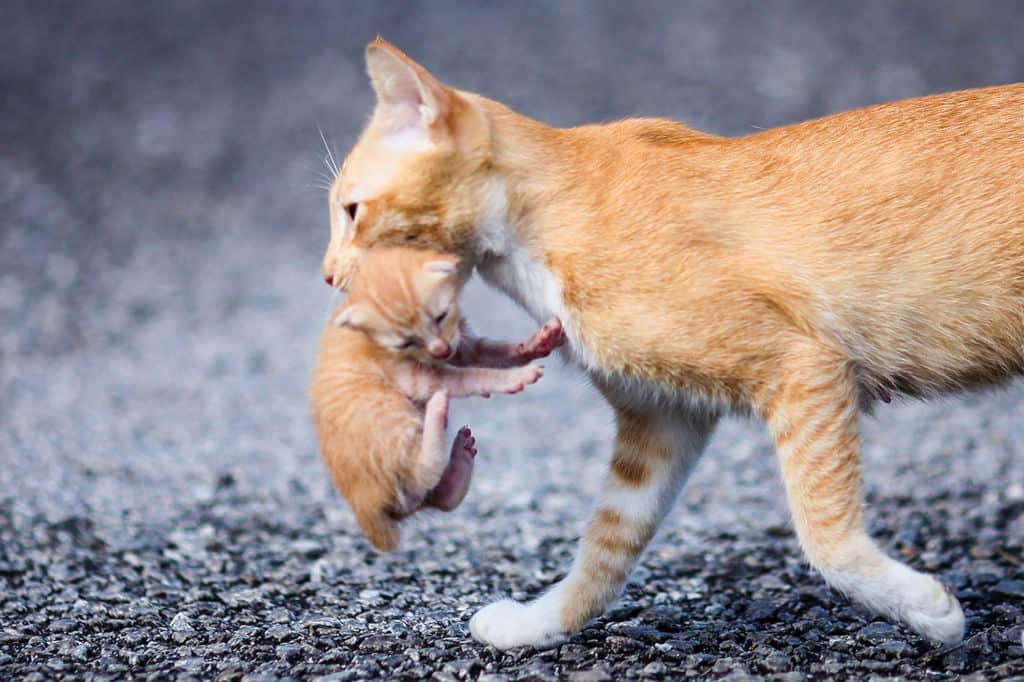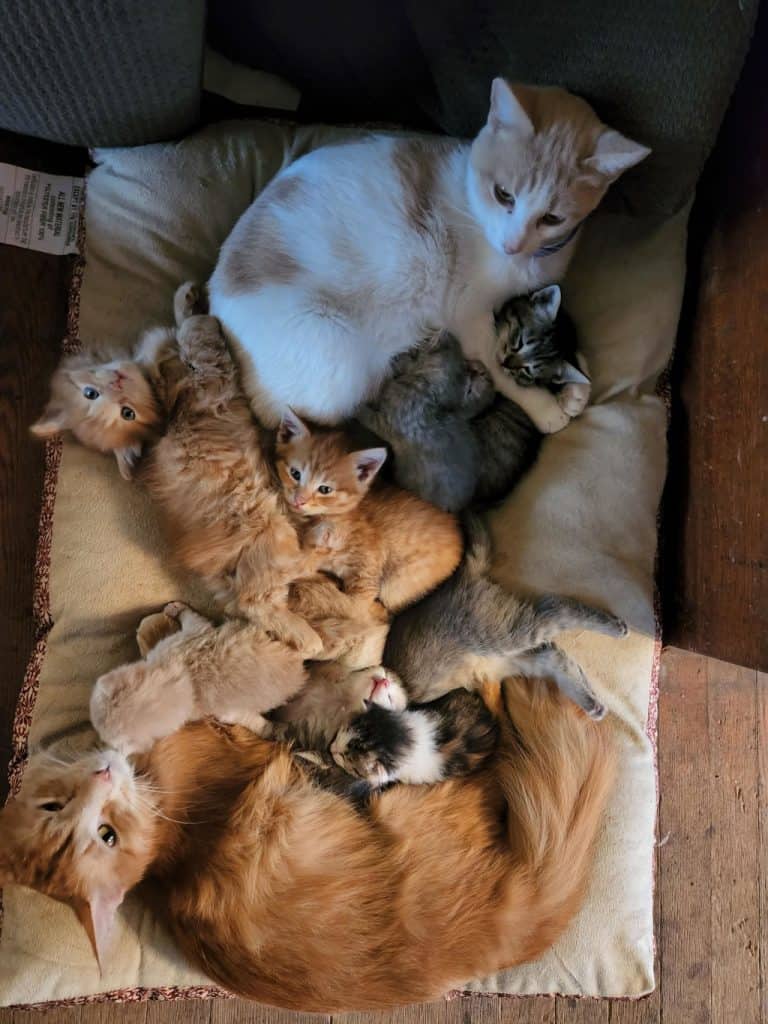We’ve all heard intriguing tales from the world of felines, and one of the most puzzling is cats seemingly ‘abducting’ the young ones of their kin.
But before you jump to any conclusions, it’s essential to dig deeper and understand the multifaceted nature of these captivating creatures.

Why Would a Cat Steal a Kitten From Another Cat?
Female cats with litters close together would look after each other’s kittens. I noticed identical behavior in my own and my friend’s cats. While one cat nursed someone else’s kittens, the other did something else.
Particularly during pregnancy, some cats show heightened maternal instincts that can make them protective, even towards kittens that aren’t their own.
Hormones can also be at work here, especially if both cats recently had kittens. When a pregnant cat starts stealing kittens, it’s a mix of protective maternal instincts and hormonal changes driving her actions. Remember to secure that the older kittens do not drive the younger ones away from their mother’s nipples.
It’s essential to understand each cat’s personality and history. A cat who has had frequent interactions with kittens in the past might show a different response compared to one encountering kittens for the first time.
Just make sure a male adult cat isn’t stealing the kittens. Male cats will sometimes take kittens and kill them to bring the mother cat into heat again. Therefore, keep males away from kittens. Male cats occasionally care for kittens, but it’s better to be safe than sorry.
Should You Separate Kittens From Other Cats?
Cats have unique personalities; while some may embrace a nurturing role, others may be standoffish or territorial, especially when kittens from another litter are introduced.
If the cats are all yours, it will depend on how they get along, how old they are, and whether they are male or adult female cats.
If we’re talking about a male adult cat, then definitely separate the male cat. It’s an instinct in male cats to sometimes kill kittens, so make sure your kittens are separated from adult males.
If it’s another female cat, there may be no reason to separate them if the mother knows the other adult female cat and they are comfortable together, but it will depend on the situation. It’s best if the kittens and the mother have their own area to give the mother some space.
Place them in a quiet room for a few days, allowing the mother to roam freely if she so desires. You can’t predict how the other cats will respond or whether they’ll welcome the kittens without injuring them.
Any relationship between kittens and a non-mother cat should be closely monitored, especially if the mom starts behaving unusually. When one of my littermates produced kittens, her sister cat tried to approach them, and the mother cat became hostile. This was the first aggression I’d witnessed, but it can happen.

How Long Should You Keep Kittens Away From Other Cats?
I recommend that kittens be kept away from all other pets for at least two to three weeks. If you recently got a kitten from a shelter, you should keep them separate for their own protection. Because the kitten could be carrying an illness, this is a precaution.
If you don’t know the mother cat or if she is new to the family, put her and her kittens in a separate room until they are at least 7–8 weeks old. If her immunization and disease status is uncertain, keep her separate until she weans kittens and is vetted and vaccinated.
The mother cat may be defensive, while the other cats might be interested. The kittens will eventually approach the other cats, who will first hiss and swat at them. Mother will become more comfortable and less defensive while staying alert as the kittens begin to roam more.
When two animals cooperate in caring for their young, this is called co-parenting. Various animal species engage in co-parenting, including lions, gorillas, dolphins, and cats.

Cats are frequently co-parents. They often create strong relationships with their littermates that can persist until adulthood. It usually occurs when the maternal cats grow up together and are related or close friends. Some cats are naturally very caring, so they won’t mind being in this situation.
If you’ve noticed your pregnant cat attempting to ‘adopt’ other kittens, remember that the world of feline behaviors is multi-layered, often rooted in instinctual drives amplified during pregnancy. Adaptive behaviors among cats, like jointly raising kittens, often depend on their health, environment, and past experiences.
Co-mothering cats usually share chores like cleaning, feeding, and guarding the kittens. Co-parenting is regarded to have numerous advantages for both the parents and the kittens, including a higher likelihood of survival.
Although this is not uncommon, it is ideal for providing a pregnant cat with a room separate from all other pets to bear her kittens. If you can, offer it, and trust her judgment.
FAQs
Why do male cats abduct kittens?
Male cats might steal kittens to kill them, eliminate competition, and make the mother come back in heat. This way, a male can get the mother pregnant again, and he will ensure more offspring. Another reason is to establish the position of the dominant cat in the area.
Why do cats take their kittens to other areas?
Mother cats may move their kittens to other areas because of safety. They do so to prevent predators from tracking them. The mother’s natural instinct is to move her kittens to regions where she feels more secure.
Do cats know each other’s pregnancies?
Cats can detect hormones and pheromones, which fluctuate during pregnancy. Cats can detect these pheromones in other cats because they have a keen sense of smell. They may not understand what it means to be pregnant, but they naturally react differently.
Do male cats recognize their kittens?
According to research, male cats may recognize their offspring through scent. However, unlike a mother cat, most do not take a personal interest in the kittens. Male cats do not generally stay around to help with the babies, regardless of whether they are his offspring.
Alex, a passionate animal lover, has experience in training and understanding animal behavior. As a proud pet parent to two dogs and three cats, he founded AnimalReport.net to share insights from animal experts and expand his knowledge of the animal kingdom.




